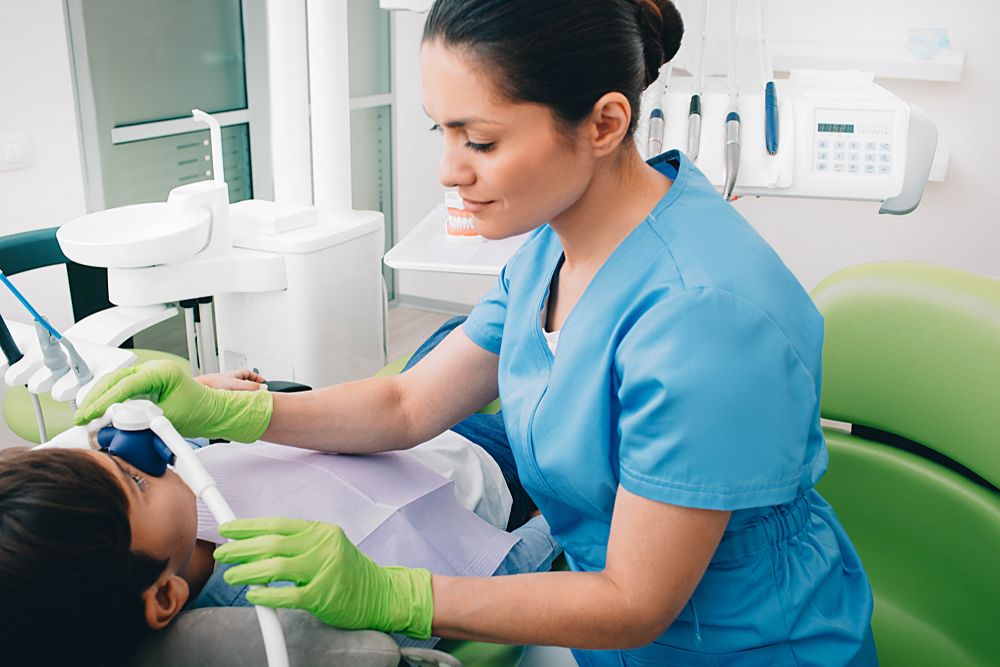When parents hear “dentistry” and “sedation” in the same sentence, it can raise eyebrows and concerns. However, sedation dentistry has made leaps in ensuring children’s dental visits are smooth and anxiety-free. One of the most widely adopted sedation methods in pediatric dentistry is nitrous oxide, commonly called laughing gas. Located in Richmond, TX, Kids 360 Pediatric Dentistry utilizes nitrous oxide to make dental procedures comfortable for children. Dive in to understand how this sedation technique can be a game-changer for your child’s dental experience.
1. What is Nitrous Oxide?
Nitrous oxide is a colorless, sweet-smelling gas inhaled through a mask placed over the nose. When combined with oxygen, it provides a safe and effective sedative, allowing patients to stay awake and responsive during dental procedures.
2. Why Choose Nitrous Oxide for Children?
- Quick Onset: The sedative effects of nitrous oxide can be felt within minutes of inhalation, making it efficient for short dental procedures.
- Adjustable Levels: The concentration can be adjusted based on the child’s needs, ensuring an individualized experience.
- Swift Recovery: Post-procedure, the effects wear off rapidly, allowing your child to return to normal activities soon after the visit.
3. Is Nitrous Oxide Safe for Children?
Absolutely. It’s imperative to note that nitrous oxide is not meant to put children to sleep. They remain conscious, and can hear and respond, but are more relaxed. When administered by trained professionals like Dr. Mayuri Appareddy, its safety and efficacy are well-established.
4. Preparing Your Child for Nitrous Oxide Sedation
Parents are pivotal in setting the stage for a positive dental experience. Discuss the upcoming procedure with your child, emphasizing that the “special air” will help them stay calm and comfy. Avoid using words that might cause apprehension, like “pain” or “needle.”
5. What to Expect During the Procedure
Once the mask is in place, your child will be asked to breathe normally through their nose. They might feel light-headed or experience a tingling sensation in their arms and legs. As the procedure progresses, these sensations will subside, and a state of relaxation will envelop them.
6. Post-Procedure Care
The effects of nitrous oxide dissipate swiftly after the gas supply is turned off. Your child will be given pure oxygen for a few minutes to aid the process. They should feel back to their usual self shortly. However, it’s always a good idea to monitor them and report any lingering dizziness or nausea to the dentist.
7. When is Nitrous Oxide Not Recommended?
While nitrous oxide benefits many, there are cases where it might not be the best fit. For instance, children with respiratory issues or those who cannot comfortably wear a nose mask might need alternative sedation methods.
Navigating Sedation Options with Dr. Mayuri Appareddy
The world of pediatric sedation dentistry can appear intricate, but parents can rest assured with a seasoned professional like Dr. Mayuri Appareddy at the helm. With her extensive expertise in Richmond, TX, she evaluates each child’s needs, ensuring that the chosen sedation method aligns seamlessly with their specific requirements.
Turning Dental Apprehension into a Giggle with Kids 360 Pediatric Dentistry
Children’s dental visits need not be fraught with anxiety. Tools like nitrous oxide can transform these appointments into relaxed, giggle-filled experiences. If you’re considering sedation dentistry for your child or have more questions about nitrous oxide, Dr. Mayuri Appareddy and the team at Kids 360 Pediatric Dentistry in Richmond, TX are here to guide. Reach out to us at (832) 271-6114.
Sources
- American Academy of Pediatric Dentistry. (2019). Use of Nitrous Oxide for Pediatric Dental Patients.
- Collette, J., Wilson, S., & Malamed, S. F. (2018). Update on the Use of Nitrous Oxide in Pediatric Dentistry. Pediatric Dentistry Journal, 28(2).
- Clark, M. S., & Brunick, A. (2015). Handbook of nitrous oxide and oxygen sedation. Elsevier Health Sciences.


